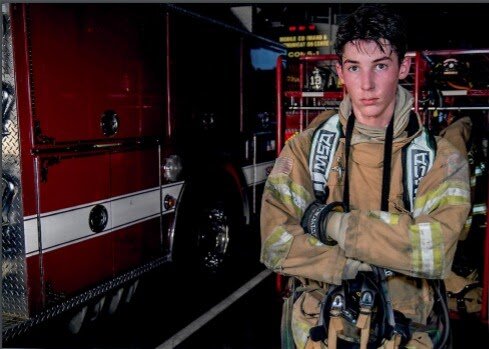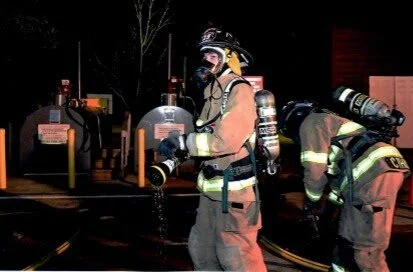Jacob Nadalini: A Young Volunteer Fireman who Works to Save Lives
by Tirzah Hopkins
Jacob Nadalini
Jacob Nadalini is an eighteen-year-old student here at NorthStar Academy. He lives in Fayetteville, North Carolina. He is not your average high schooler.
Jacob has been a volunteer fireman at Stoney Point Fire Department, Station 13, for a few months now. Where he lives, if you want to become a volunteer fireman, you talk to the fire chief about it. You have to fill out liability waivers, and you have to be at least sixteen. Once you’ve done this, you can come aboard a program. The guys there vary in ages from sixteen to at least thirty. You get trained and become fully qualified. If you’re under eighteen, you’re not allowed to go into burning buildings, but you can do everything else. A volunteer fireman does everything a normal fireman does, for free.
He heard about volunteer firefighting from a friend. He said, “Since I was doing online school, I had a lot of free time and, you know, I don’t like being lazy, so I got squared away, and now I love it.” They also issue you your gear for free.
So far, Jacob has been to four actual fires, but he’s been to one hundred and sixty calls total. Not all of being a fireman is dealing with fires. You get called for medical stuff, fire alarms, gas leaks, water rescue, overdoses, cardiac arrest; or if a tree falls in the middle of the road, it’s the firemen who come, cut it up, and move it out of the way.
His first fire was a car fire, which are pretty “sketchy” because they can explode at any time. Once they got called in for a house that was filled with asbestos, which is a spore that, if you breathe it, can irritate your lungs badly and cause scarring. It can cause cancer or other lung diseases if you’re living in a house that has it. The house collapsed on itself. Once, he was called to a shooting at three AM. He says, “The alarm goes off and you just have to get in your gear and go. Since a lot of the calls are from people who were there and called, there are miscommunications. So, sometimes they call in for an outside fire, and it’s a car fire, sometimes they say a person feels sick and it’s actually cardiac arrest.”
Jacob himself hasn’t gotten his EMT certification because of the requirements, one of which is having a high school diploma. But you can be a volunteer fireman/EMT, or you can just be a volunteer EMT. He knew a guy on night duty who was only an EMT. He just handled the medical stuff and didn’t have to train with the firefighters.
He doesn’t plan on firefighting being his full career in the future. He plans on doing it part-time and having another real job, which would probably be law enforcement. What he likes most about the firefighting is that he can go into work every day, and it will always be different. No day has been like the other.
Jacob does two different shifts, a twelve-hour night shift and a twenty-four-hour night-and-day shift. For the twelve-hour night shift he goes in at seven PM and leaves at seven AM. For the twenty-four-hour shift, he goes in at seven AM and leaves the next day at seven AM. He mostly does twelve-hour shifts, but sometimes he does a twenty-four-hour shift. Those are optional, but he does them because he likes it.
Here’s what a twenty-four-hour shift would look like: He gets up at five, gets dressed, gets in his uniform, gets some coffee, eats some breakfast with the day crew, talks with them, and signs in. Then they’ll work on the trucks, clean them, check the equipment, and do station cleaning, which happens every day. They’ll fix the things that are broken, they’ll check the chainsaws on the truck, or do inventory. If they get a call before or during inventory, they have to go even if they don’t have everything they might need. A lot of the calls are fake. Some people will see smoke and think it’s something serious; some people will hear a fire alarm and think there’s a fire. Like it was said before, you don’t know how serious something is until you get someone on the scene. At twelve-thirty they’ll have lunch; sometimes they’ll drive to Harris Teeter and make a meal; sometimes they’ll get pizza or eat food they brought from home. After that, they might nap for an hour or so or do some more work that needs to get done. Then they do busywork until five if they don’t have any calls. It’s usually “smooth sailing.”
Even though Jacob works at Station 13, sometimes he’ll go to the new station, Station 19, if they need more people. It’s about a fifteen-minute drive from Station 13, and there’s a lake in between. He usually does the twelve-hour night shift there. They’ll order dinner, talk, laugh, eat ice cream, and go to bed. Sometimes they’ll get a call and go to work. Otherwise, he’ll leave at seven the next morning.
He has to go in every Monday, and sometimes Friday and Saturday. He goes most days, though. The great thing about being a volunteer firefighter is you do it because you want to, not because you’re getting paid to do it. He does twenty-four-hour shifts sometimes, and once he stayed for forty-eight hours just because he wanted to, and he still has plenty of time for school.
Another reason Jacob loves the volunteer firefighting is that it gives him experience in that kind of environment, with the people, and with the job that is important for him to have. He says you also get a lot of life experience, and at a young age, that’s a great thing to have. He also feels that working in the environment is great for what he wants to do later.
One thing he thought was important to say was that a lot of people have misconceptions with volunteer firefighting. He says, “I’ll talk to someone, they’ll ask, ‘What do you do?’ I’ll tell them volunteer firefighting and they’ll say, ‘Oh, that’s not the real thing, you’re just a volunteer.’ But actually we have the same qualifications, same training, and we do the exact same thing, we just don’t get paid for it.” Another great thing is that, since he’s certified, he’s able to work as a firefighter anywhere else in the country.
Working as a volunteer firefighter is a great way to get experience and be doing something worth-while, and especially if you’re doing online school, you’ll have time for it and other important things.
Tirzah Hopkins has been at NSA for about two years. She lives in Indiana, USA with eight of her eleven siblings and mom and dad. She has recently started writing for the Navigator. She enjoys spending time with family, hiking, karate, writing, and playing with babies.



